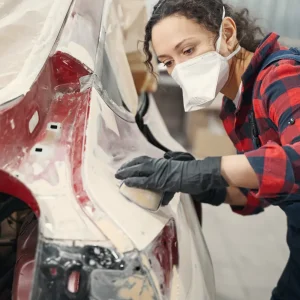For fleets, vehicle expenditure is often the second largest line after wages on their balance sheet, and probably the line most exposed to neglect.
Fleet management company MDEL Fleet Management launched in 2017, based out of Chesterfield, and was built around the pain points and the huge costs that stem from the fleet within each company.
The company was started by Mike Cuckson, who saw an opening gap in the market for a fleet management company that could help multiple fleets to operate more efficiently, while reducing their costs.
His daughter, Roxanne Cuckson, left school after sixth-form and was looking for an opportunity to begin her work journey when her dad approached her about the role of fleet manager. “I was in search of an active role, particularly within the transport police,” Cuckson tells us, “but I felt strongly about helping my dad’s business grow and started in the role of fleet manager three years ago.”
Addressing fleet pain points
Starting the company, the Cucksons became increasingly aware of the pain points for business owners around their fleets. “As a business we realised that it was near impossible for fleet managers to keep tabs on all of their drivers, ensuring that they are safe and their vehicles are roadworthy,” Cuckson tells us.
Cuckson spends her days communicating with their various fleets to monitor for vehicle requirements and defects. She then organises taking those vehicles to garages and responding as quickly as possible to roadside incidents. With a team on the phones 24 hours a day, 7 days a week and 365 days a year, Cuckson says, “It’s basically a mini control centre where we arrange all the bookings for our drivers for anything involving their vehicle.”
The fleet management company manages just short of 1000 cars and light commercial vehicles, offering services from MOT and repair bookings and servicing and repairs, to vehicle tracking and telematics. The company helps mostly small- to medium-sized enterprises, with fleets operated for commuting, sales appointments, and delivery or service offerings. “Anything vehicle related, we can generally help fleets with it,” Cuckson says.
Intelligent maintenance
Cuckson and her dad realised the complexity of fleets keeping tabs on all of their drivers to ensure they are safe and their vehicles are roadworthy. That’s why they decided to go down the route of Intelligent reporting and the ability to monitor every type of expenditure associated with a fleet, helping them to achieve optimum cost control.
“When handling a fleet, a seemingly small administrative oversight can very quickly escalate to a serious problem,” Cuckson explains. “Missing an MOT, for example, could have disastrous consequences, if the vehicle was involved in an accident.”
The company’s software provides a system of support for fleets, with a direct link to the DVLA for MOT and RFL (Road Fund License) alerts. This cloud-based system includes a unique ‘traffic light’ alert function, providing an overall picture of the fleet’s health with more than 85 alert types. “Our aim is to bring everything together to simplify vehicle management for fleet managers, because let’s be honest, that’s what is needed to ensure a successful and efficiently run fleet,” says Cuckson.
MDEL Fleet runs a Fleetcheck driver app, which allows drivers to report issues and track their mileage. “Every fleet member is given a fleet card to keep in their vehicle with our contact details on. Our phones are manned 24/7 including weekends so no matter what time or what place, we can assist your drivers.”
Cuckson explains fleets like this software as it allows drivers to complete daily, weekly, or monthly checks and report defects such as tyres, windscreen, or request maintenance such as a service or repair. “As soon as they send a report, we aim to respond within ten minutes so they know that we have received it and are working on it. This means there is a trail and nothing is missed, as it comes through as an email alert to us, as well as appearing on the system as an alert.”
A bonus of this app is helping keep costs down for fleets via preventative maintenance. “We believe in spotting issues before they become a safety issue so we’re encouraging drivers to notice things before they turn into bigger problems,” explains Cuckson. “For example, after doing their walkaround check, a driver may notice their front tyres are worn down. They can then report it, and we can get them replaced in hours, no call out. It also means the driver isn’t putting the company in jeopardy by driving the vehicle illegally.”
Cuckson says the benefit of using the service is that fleets can get on with their day and significantly reduce downtime. “We keep a close eye on costs and everything is fed back into the Fleetcheck system, so we can report cost-per-vehicle per month, as well as offering many other reports for statistics. We also ensure all work is done in a timely fashion so services aren’t missed, which could void warranty, and MOTs are also booked well before time,” she says.
Another offering from MDEL to fleets is mobile servicing and repairs. “No matter where you are in the UK, we can attend with a mobile service van to carry out the work required,” Cuckson tells us. “It is true that some repairs have to be undertaken in a workshop, but we can save you time, money and energy by attending site when possible to complete repairs and service work.”
Driving down costs for fleets is also achieved with the use of telematics and vehicle tracking. The company has introduced a driver score system for one of the fleets it manages, which Cuckson explains encourages drivers to drive at the speed limit to receive a bonus or some reward. “This way of thinking has significantly helped reduce fuel costs a lot more than we thought it would by adding in some healthy competition to ensure the vehicles are being driven correctly.”
Through the introduction of telematics on this fleet, MDEL has seen a 25% reduction in fuel consumption, a 15% increase in productivity, and a 15% reduction in employee overtime.
MDEL introducing the driver score system has also resulted in drivers speeding far less. “The drivers are much more aware of the road and their driving now, which is a big positive. We currently only run this on one of the larger fleets we manage, but it has yielded very positive results and we will likely expand this service to more fleets,” Cuckson explains.
The electrification challenge
One of the greatest difficulties faced by all fleet operators is dealing with the ongoing number of changes that have occurred in recent years. Among all of the fleets managed by MDEL Fleet Management, Cuckson says MDEL still sees a few diesel and petrol vehicles but they have a good percentage of electric and hybrid vehicles, which she expects to continue to increase.
In fact, the main change Cuckson has witnessed since starting her role as fleet manager is the growth of the electric and hybrid vehicle market. “It really changes the way you can handle fleets,” Cuckson says. She continues, “If an electric or hybrid vehicle breaks down, it is recovered straight into the main dealer, as it is too dangerous to work at the side of the road with high voltage. We also notice vehicles that are electric or hybrid require regular software updates and although the servicing is cheaper, the tyres do have to be changed regularly.”
For these reasons, Cuckson believes the electric and hybrid vehicle market is a main challenge fleets face right now. “It is a totally new way of managing a fleet, as service intervals are different to ordinary vehicles, and they require training of our staff to know how to deal with each situation as it arises,” she explains.
Fleet management has a future
As for the role of the fleet manager, Cuckson has witnessed its uptick. “Companies need their fleets to be effectively managed, but I do feel it’s the case that internal fleet managers are given 100 other things to do which makes them ineffective with the fleet management role,” she says.
Many of the fleets looked after by Cuckson and her team have lost internal fleet managers due to them being at their “wits’ end” because of the time taken up in the day sorting issues with vehicles and not having the correct resources or contacts to get the best results as quickly as possible. Cuckson explains, “I think one of the most effective things about MDEL Fleet Management is that we have the contacts and the time to make fleet management really successful. Don’t get me wrong, we are really flat out, but with it being where our expertise lies, we can make a big impact and save companies time and money.”





